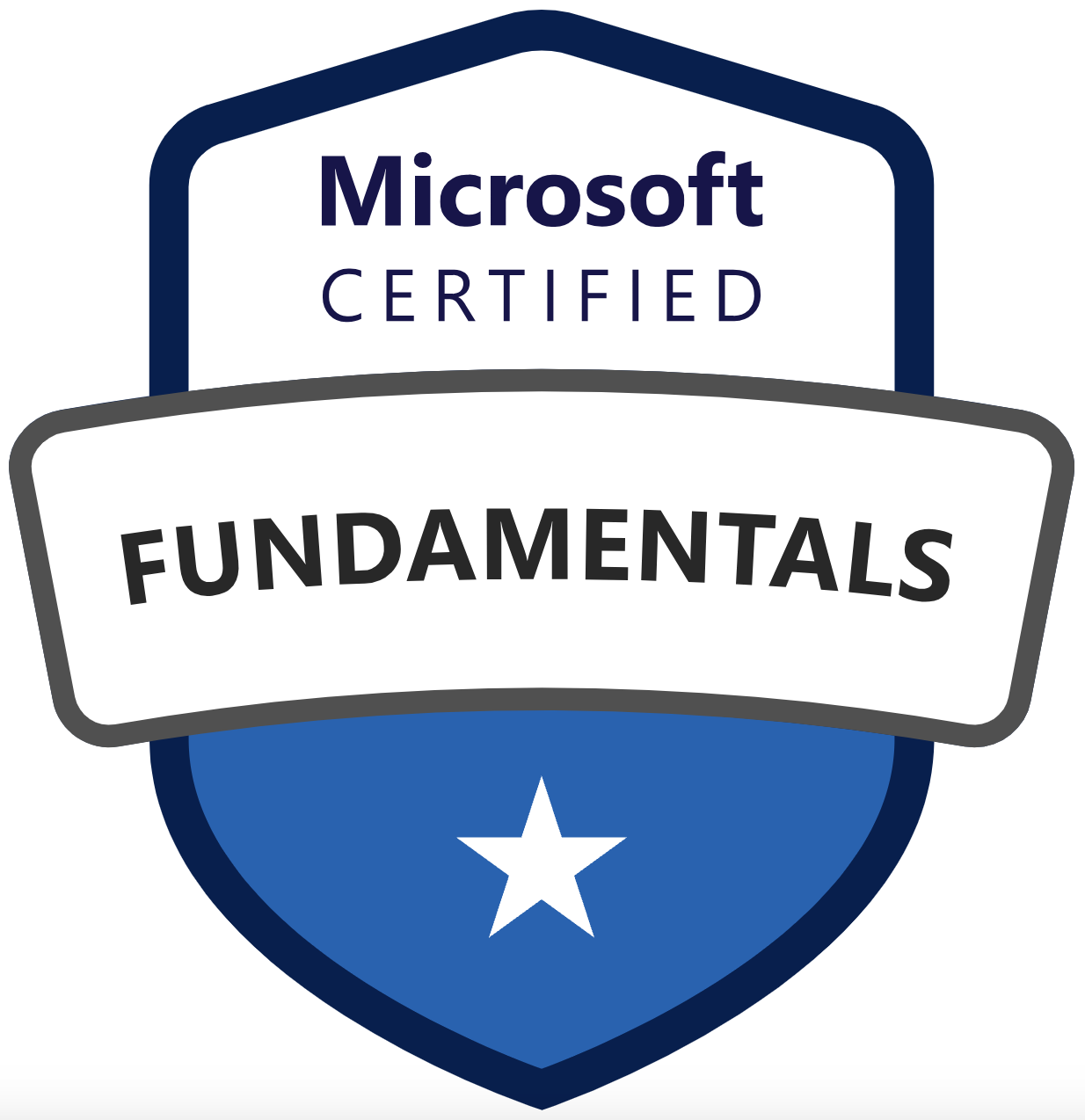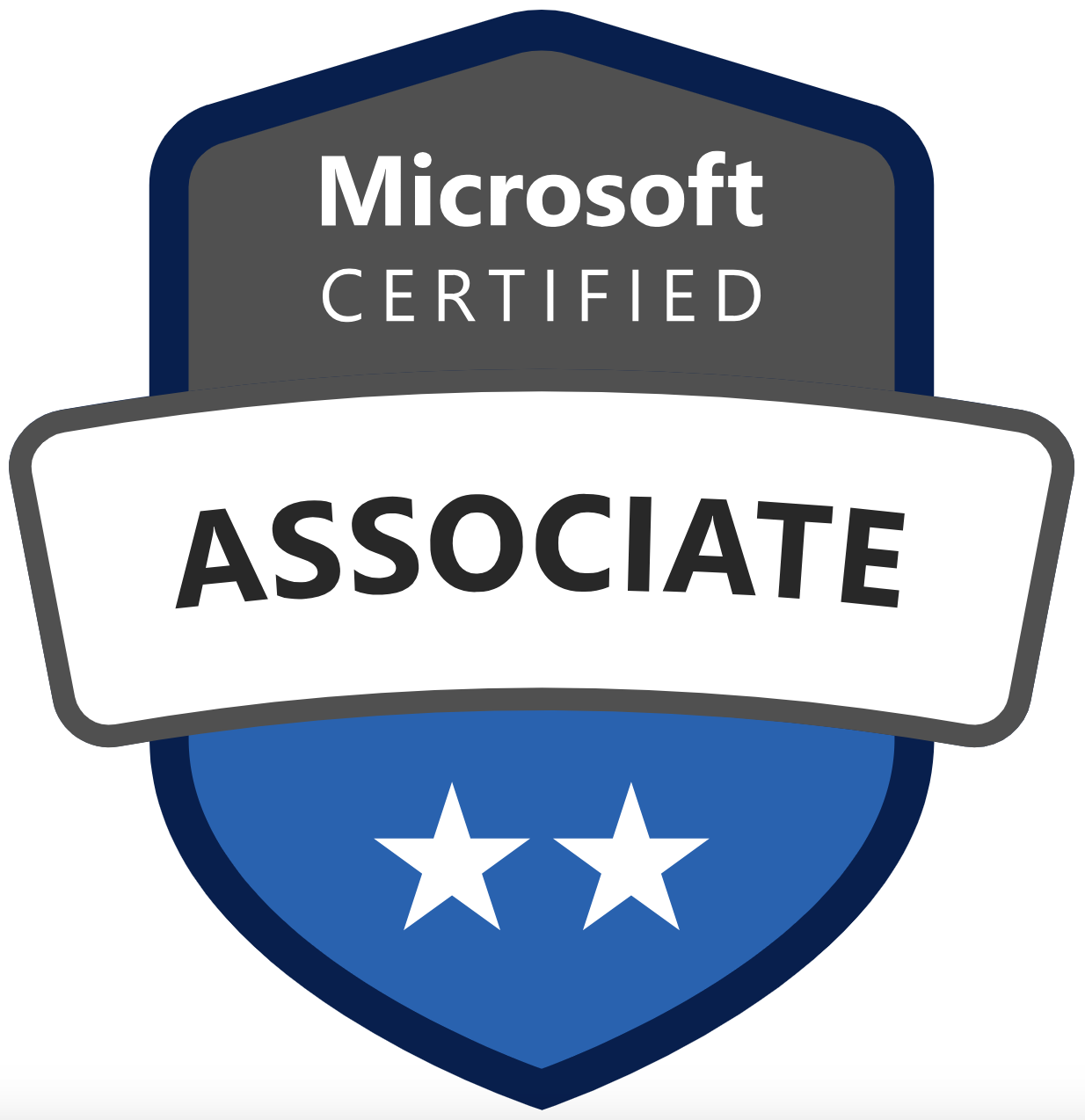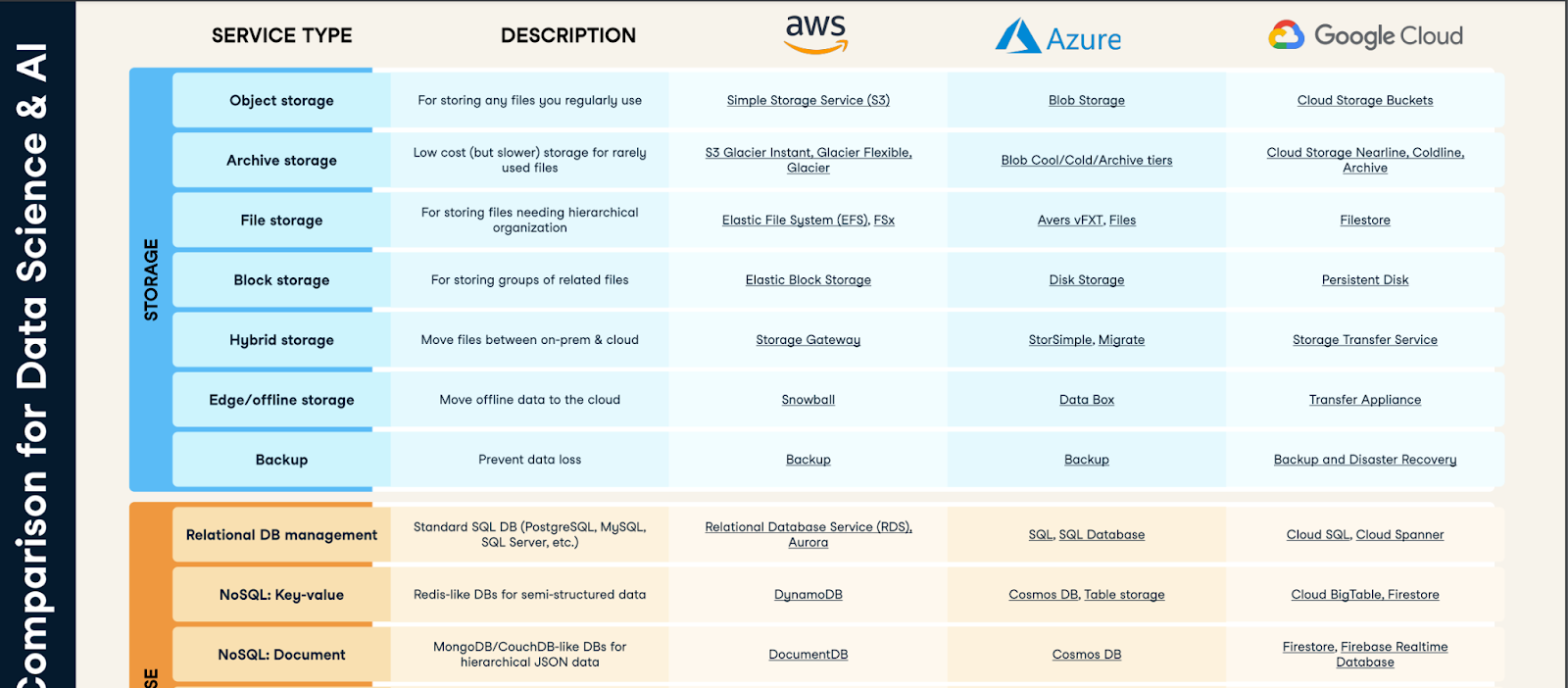Track
In this guide, we explore the world of Azure certifications, highlighting their significance in the burgeoning field of cloud computing and data science. As technologies evolve and the demand for skilled professionals in cloud services and data science grows, Azure certifications stand as a testament to an individual’s expertise and commitment to staying abreast of industry trends and technologies.
This article is tailored for beginners who are taking their first steps into the realm of cloud computing and data science, as well as data practitioners seeking to enhance their skills and credentials. Whether you are looking to kickstart your career, pivot to a new domain, or simply expand your skill set, understanding the landscape of Azure certifications can be a game-changer.
Become Azure AZ-204 Certified
Why Azure Certification?
Let’s look at some of the reasons why to get certified in Azure.
Market Trends in Cloud Computing
As of the third quarter of 2025, the global cloud infrastructure market has experienced significant growth, with enterprise spending reaching $107 billion, marking a 28% increase from the same period in 2024.
The landscape of cloud computing is witnessing a rapid transformation. As businesses increasingly migrate to the cloud, the demand for skilled cloud professionals is soaring. Azure, Microsoft's cloud computing service, is at the forefront of this revolution. With its wide array of services and solutions, Azure is becoming a critical tool for organizations across various sectors. Azure is currently the second-largest player in the cloud computing market, with a share of around 20%, second only to AWS (read more about AWS certification in our separate guide).
Role of Azure in Current Tech Landscape
Azure’s diverse offerings in AI, machine learning, and big data analytics are reshaping how businesses operate. By leveraging Azure, companies are unlocking new efficiencies and capabilities. This dynamic environment creates a fertile ground for professionals who possess the know-how to navigate and utilize Azure effectively. Azure has over 600 cloud services, and it edges the market among light and moderate cloud users.
Benefits of Azure Certification for Career Advancement
Earning an Azure certification validates your skills and knowledge in the cloud domain, setting you apart in a competitive job market. It demonstrates to employers your commitment to professional growth and your proficiency in one of the leading cloud platforms. Whether you aim to advance in your current role or pivot to a new career path, Azure certification can be a key stepping stone.
Understanding Azure Certification Levels

Fundamental Azure Certifications
Fundamental certifications are the starting point in the Azure certification journey. Designed for beginners, they cover basic cloud concepts and Azure services. This level is ideal for those new to cloud computing or seeking to understand the basics of Azure.
If you’re a newcomer to the field, you can get started with DataCamp’s Introduction to Azure and Cloud Computing Concepts courses.
Available certifications:
1. DataCamp's Azure Fundamentals Certification
- Who It's For: Beginners looking to kickstart their journey in cloud computing, specifically with Microsoft Azure. Suitable for IT professionals, students, and those curious about cloud technology.
- Skills Covered: Core cloud concepts and services, Azure's architectural components: computing, networking, storage, and security; hands-on experience with Azure tools such as containers, virtual machines, and pricing calculators; role-based access control in Azure; preparation for the Microsoft AZ-900 certification exam.
- Prerequisites: No prior knowledge or coding experience is required. This course is designed for absolute beginners who are new to cloud computing and Microsoft Azure.
- Cost: Free as part of a DataCamp Premium subscription, which starts from $25 per month. Additionally, you’ll receive a 50% discount on the Microsoft AZ-900 exam fee.
2. AZ-900: Azure Fundamentals
- Who It's For: Individuals with technical or non-technical backgrounds interested in understanding AI and machine learning concepts using Azure services.
- Skills Covered: Basic AI and machine learning concepts, Azure AI services, computer vision, natural language processing, conversational AI, generative AI, including Azure OpenAI Service.
- Prerequisites: Familiarity with basic cloud concepts and client-server applications is beneficial but not required.
- Cost: $99 USD
3. AI-900: Azure AI Fundamentals
- Who It's For: Individuals with technical or non-technical backgrounds interested in understanding AI and machine learning concepts using Azure services.
- Skills Covered: Basic AI and machine learning concepts, Azure AI services, computer vision, natural language processing, and conversational AI.
- Prerequisites: Familiarity with basic cloud concepts and client-server applications is beneficial, but not required.
- Cost: $99 USD
4. DP-900: Azure Data Fundamentals
- Who It's For: Individuals beginning to work with data in the cloud, covering both technical and non-technical roles.
- Skills Covered: Core data concepts, relational and non-relational data on Azure, and analytics workloads.
- Prerequisites: Familiarity with data concepts and cloud environments recommended but not required.
- Cost: Approximately $99
Associate Azure Certifications

Associate certifications are for individuals with some experience in cloud services. They delve deeper into specific roles like Azure Administrator, Developer, or Security Engineer. These certifications require foundational knowledge of Azure and typically involve more complex concepts than the fundamental level.
Available certifications:
5. AZ-104: Azure Administrator Associate
- Who It's For: Individuals with Azure administration experience, managing cloud services that span storage, networking, and compute cloud capabilities.
- Skills Covered: Managing Azure identities, governance, storage, compute, and virtual networks in a cloud environment.
- Prerequisites: Six months of hands-on experience administering Azure, strong familiarity with core Azure services, Azure workloads, security, and governance.
- Cost: $165
6. AZ-204: Azure Developer Associate
- Who It's For: Experienced developers familiar with Azure.
- Skills Covered: Designing, building, testing, and maintaining cloud applications and services on Azure.
- Prerequisites: At least one year of professional development experience and knowledge of Azure.
- Cost: $165 USD
7. AZ-500: Azure Security Engineer Associate
- Who It's For: IT professionals specializing in security and compliance.
- Skills Covered: Implementing security controls, maintaining posture, identifying vulnerabilities, and using a variety of security tools.
- Prerequisites: Strong skills in scripting, security, and Azure services.
- Cost: $165 USD
8. DP-100: Azure Data Scientist Associate
- Who It's For: Data scientists and professionals working on Azure to implement and run machine learning workloads.
- Skills Covered: Designing and implementing data science and machine learning solutions on Azure.
- Prerequisites: Experience with data science and Azure Machine Learning.
- Cost: $165
9. DP-203: Azure Data Engineer Associate
- Who It's For: Data engineers focusing on data solutions in Azure.
- Skills Covered: Designing and implementing data storage, data processing, and data security, along with monitoring and optimizing data solutions.
- Prerequisites: Knowledge of data processing languages (e.g., SQL, Python) and Azure data services.
- Cost: $165 USD
10. DP-300: Azure Database Administrator Associate
- Who It's For: Database administrators and data professionals.
- Skills Covered: Managing relational databases on Azure, including security, performance, and availability.
- Prerequisites: Experience with database concepts and Azure SQL.
- Cost: $165 USD
11. PL-300: Power BI Data Analyst Associate
- Who It's For: Data analysts who leverage Power BI for data analysis and visualization.
- Skills Covered: Preparing data, modeling data, visualizing data, and analyzing data using Power BI.
- Prerequisites: Experience with data analysis and non-relational and relational data from various data sources.
- Cost: $165 USD
Expert Azure Certifications

Expert certifications are the pinnacle of Azure credentials. Targeted at seasoned professionals, these certifications demand a deep understanding of Azure services and architecture. They are suited for individuals who have extensive experience and specialize in areas like Azure Solutions Architect or DevOps Engineer.
Available certifications:
12. AZ-305: Azure Solutions Architect Expert
- Who It's For: Solutions architects and engineers focusing on Azure infrastructure solutions.
- Skills Covered: Designing solutions that run on Azure, including aspects like compute, network, storage, and security.
- Prerequisites: Advanced experience and knowledge of IT operations, including networking, virtualization, identity, security, business continuity, disaster recovery, data platforms, and governance.
- Cost: $165 USD
13. AZ-400: Microsoft DevOps Engineer Expert
- Who It's For: Professionals in DevOps roles focusing on Azure.
- Skills Covered: Combining people, processes, and technologies to continuously deliver valuable products and services.
- Prerequisites: Familiarity with Azure administration and development, and expertise in at least one of these areas.
- Cost: $165 USD
Comparison of all Azure Certifications in 2026
Below is a table comparing all of the available Azure certifications to help you choose the right one:
| Certification | Who It's For | Skills Covered | Prerequisites | Cost (USD) |
|---|---|---|---|---|
| Azure Fundamentals | Beginners in cloud services | Core cloud concepts, Azure architecture, containers, virtual machines, role-based access control | None | $25/month |
| AZ-900 | Beginners in cloud services | Basic Azure services and cloud concepts | None | $99 |
| AI-900 | Individuals interested in AI and ML | Basic AI and ML concepts, Azure AI services | Familiarity with basic cloud concepts | $99 |
| DP-900 | Individuals starting with data in the cloud | Core data concepts, Azure data services | Familiarity with data concepts | $99 |
| AZ-104 | Azure administrators | Azure identities, governance, storage, compute, virtual networks | Six months of Azure experience | $165 |
| AZ-204 | Experienced developers | Designing and maintaining cloud services | One year of development experience | $165 |
| AZ-500 | IT security specialists | Security controls, maintaining posture | Skills in scripting, security, Azure services | $165 |
| DP-100 | Data scientists | Data science and ML solutions | Experience with data science and Azure ML | $165 |
| DP-203 | Data engineers | Data storage, processing, security | Knowledge of SQL, Python, Azure data services | $165 |
| DP-300 | Database administrators | Managing relational databases | Experience with database concepts and Azure SQL | $165 |
| PL-300 | Data analysts using Power BI | Data preparation, modeling, visualization | Experience with data analysis | $165 |
| AZ-305 | Solutions architects | Azure solutions design | Advanced IT operations experience | $165 |
| AZ-400 | DevOps professionals | Delivering products and services | Familiarity with Azure administration and development | $165 |
How to Choose an Azure Certification
Navigating the world of Azure certifications can be overwhelming given the wide range of options available. Whether you’re new to Azure or looking to specialize further, choosing the right certification is crucial to aligning your professional development with your career aspirations. Here’s how you can make an informed decision:
1. Assess your current skill level
Before diving into the specifics of each certification, evaluate your current understanding of Azure services. If you’re new to Azure, starting with a fundamental level certification, such as the Azure Fundamentals (AZ-900), can provide a solid foundation. For those with more experience, consider an associate or expert level certification that matches your skills.
2. Identify your career goals
Think about where you see yourself in the future. Are you aiming to become a Cloud Architect, a DevOps Engineer, or perhaps a Data Scientist? Your career goals should guide your certification choice, ensuring it aligns with the roles and industries you’re interested in.
3. Research the market demand
Look into job listings that interest you and note the certifications frequently mentioned. Some roles may prefer candidates with specific certifications. Understanding market trends and employer preferences can help you select a certification that will enhance your employability and relevance in the job market.
4. Consider your learning style
Everyone has a unique learning style, so consider how you learn best when choosing a certification path. Microsoft offers various resources, including online courses, instructor-led training, and hands-on labs. Similarly, DataCamp has a wide range of resources that can help you master many of the skills you'll need. Choose a certification with learning resources that match your preferred method of study to facilitate an effective learning experience.
5. Review the certification pathway
Microsoft Azure certifications are structured in a pathway from fundamental to expert levels. Review these pathways to understand the progression and prerequisites required for each certification. Some certifications may require you to pass a fundamental exam before moving on to more advanced certifications.
6. Plan for future growth
Consider certifications that not only meet your current goals but also offer pathways for continued learning and advancement. The field of cloud computing evolves rapidly, so selecting a certification that allows for further specialization or advancement can help keep your skills relevant.
Preparing for Azure Certification with DataCamp
DataCamp offers a range of courses and materials that can help with Azure certifications, such as our introduction to Azure course. These resources are designed to build foundational knowledge and advance to more complex concepts.

Our AWS, Azure and GCP Service Comparison for Data Science & AI cheat sheet can help you prepare for Azure certification.
There are several other ways you can prepare for Azure certification:
Understand the Exam Objectives
Begin by thoroughly reviewing the exam objectives and skills measured. This information is available on the official Microsoft certification webpage for each exam. Understanding what is expected will help you focus your study efforts effectively.
Utilize Learning Resources
Look for resources like DataCamp courses, Microsoft materials, books, and practice tests. These can provide different perspectives and additional practice opportunities. Use our courses and cheat sheets, such as this AWS, Azure and GCP Service Comparison for Data Science & AI cheat sheet.
DataCamp's structured programs guide learners from basic to advanced levels with a blend of theory and practical exercises. For a comprehensive preparation, it's advisable to follow these structured paths and regularly test your knowledge with the quizzes and projects provided.
Hands-On Practice
Theoretical knowledge is important, but practical experience is crucial. Use Microsoft Azure's free tier or sandbox environment to get hands-on practice with Azure services. Experimenting in a real Azure environment will deepen your understanding. You can also utilize DataCamp's interactive learning platform for practical experience.
Join Study Groups and Online Communities
Engaging with others who are also preparing for the exam can be beneficial. Join online forums, study groups, or communities (like those on DataCamp, LinkedIn, Reddit, or Microsoft’s own Tech Community) to share knowledge and ask questions.
What Jobs Can You Get with Azure Certification?
Earning an Azure certification opens up a multitude of career opportunities in the IT sector. Below, we outline several key job roles that Azure-certified professionals are well-suited for, focusing on their primary responsibilities and the skills they need.
Cloud Architect
- What they do: Design and implement an organization's cloud computing strategy, including cloud adoption plans, application design, and management.
- Skills needed: Expertise in Azure infrastructure and services, cloud solution design, and cloud security.
DevOps Engineer
- What they do: Work to integrate development and operations to improve software development, deployment, and maintenance.
- Skills needed: Proficiency in Azure DevOps, CI/CD pipelines, automation scripts, and cloud service management.
Solutions Architect
- What they do: Design and implement complex solutions that meet business requirements.
- Skills needed: Deep understanding of Azure services, solution design principles, and architectural best practices.
Azure Administrator
- What they do: Manage and configure cloud services, including networking, storage, security, and compute capabilities.
- Skills needed: Knowledge of Azure administration, PowerShell, Azure CLI, and cloud architecture.
Security Engineer
- What they do: Ensure the security of cloud applications and data from threats.
- Skills needed: Skills in cloud security, identity management, threat mitigation, and familiarity with Azure security tools.
Data Engineer
- What they do: Design and implement management, monitoring, security, and privacy of data using the full stack of Azure data services.
- Skills needed: Experience with Azure data storage solutions, data processing, and data security practices.
AI Engineer
- What they do: Use AI and machine learning to build intelligent solutions that enhance business processes.
- Skills needed: Proficiency in Azure AI services, machine learning models, and cognitive services integration.
Data Scientist
- What they do: Apply data science and machine learning techniques to analyze and interpret complex data on Azure.
- Skills needed: Knowledge of Azure Machine Learning, model training and deployment, and data analytics.
IoT Developer
- What they do: Develop and maintain Internet of Things (IoT) solutions, integrating devices, managing data, and ensuring security on Azure.
- Skills needed: Proficiency in Azure IoT Hub, Azure Digital Twins, and device security for IoT solutions.
Network Engineer
- What they do: Design, implement, and manage networking solutions within Azure, ensuring optimal connectivity and security.
- Skills needed: Expertise in Azure networking services, VPN configurations, hybrid network setups, and network security.
Below is a table that matches Azure certifications to potential job roles and responsibilities. This table can help you understand the career opportunities associated with each certification, providing clarity on how pursuing these certifications can align with specific career paths:
| Azure Certification | Potential Job Roles | Responsibilities |
|---|---|---|
| Azure Fundamentals (AZ-900) | Cloud Technician, IT Support Specialist | Understand basic cloud concepts, assist in cloud service management, support IT operations, and troubleshoot basic Azure issues. |
| Azure AI Fundamentals (AI-900) | AI Technician, Junior AI Developer | Understand AI and ML concepts, assist in implementing Azure AI services, support AI solution development. |
| Azure Data Fundamentals (DP-900) | Data Technician, Junior Data Analyst | Understand core data concepts, assist in data management on Azure, support data analytics projects. |
| Azure Administrator Associate (AZ-104) | Azure Administrator, Cloud Systems Administrator | Manage Azure identities and governance, implement and manage storage solutions, configure and manage virtual networks, monitor and backup Azure resources. |
| Azure Developer Associate (AZ-204) | Azure Developer, Cloud Application Developer | Design and build cloud applications, implement Azure compute solutions, develop for Azure storage, integrate Azure services. |
| Azure Security Engineer Associate (AZ-500) | Security Engineer, Cloud Security Specialist | Implement security controls and threat protection, manage identity, access, and data protection, secure network and compute resources on Azure. |
| Azure Data Scientist Associate (DP-100) | Data Scientist, Machine Learning Engineer | Implement and run machine learning workloads, design and deploy models in Azure, optimize and monitor data science solutions. |
| Azure Data Engineer Associate (DP-203) | Data Engineer, Cloud Data Specialist | Design and implement data storage solutions, develop and orchestrate data processing, manage and secure data solutions in Azure. |
| Azure Database Administrator Associate (DP-300) | Database Administrator, SQL Database Administrator | Manage database performance, security, and availability, implement automation for database tasks, configure and manage Azure SQL databases. |
| Power BI Data Analyst Associate (PL-300) | Data Analyst, Business Intelligence Analyst | Prepare and model data, visualize and analyze data using Power BI, deploy and maintain reports and dashboards, provide insights to business stakeholders. |
| Azure Solutions Architect Expert (AZ-305) | Solutions Architect, Cloud Architect | Design cloud solutions that meet business requirements, plan and implement cloud migration strategies, ensure security and compliance of cloud solutions. |
| Microsoft DevOps Engineer Expert (AZ-400) | DevOps Engineer, Cloud DevOps Specialist | Implement DevOps practices, manage CI/CD pipelines, improve collaboration between development and operations, automate deployment and monitoring. |
Final Thoughts
It's clear that these Azure certifications are more than just accolades; they are a pathway to deepening your understanding and expertise in cloud computing. Whether you're starting with the fundamentals, aiming for an associate level, or targeting expert certifications, each step in this journey equips you with vital skills for today’s technology-driven landscape.
Get started towards certification today with DataCamp’s Azure Fundamentals Certification, Introduction to Azure, and Cloud Computing Concepts courses. If you're a more experienced learner, you can check out our Azure Architecture and Services course, which delves into the heart of Azure's infrastructure, covering cloud computing basics and insights into Azure's organizational structure.
Become Azure AZ-204 Certified

A senior editor in the AI and edtech space. Committed to exploring data and AI trends.
Azure Certification FAQs
How Do I Get Started with Azure Certification?
To get started:
- Identify the certification path that aligns with your career goals and experience level. Microsoft offers certifications ranging from fundamental to expert levels across various roles.
- Prepare for the exam by utilizing Microsoft's learning paths, online courses, and practice tests.
- Schedule your exam through the Microsoft website or a certified testing center.
How Long Does It Take to Become Azure Certified?
The time it takes to become Azure certified varies based on your background, the certification level, and how much time you dedicate to study and practice. On average, it can take anywhere from a few weeks for a fundamental certification to several months for more advanced certifications.
Is Azure Certification Worth It?
Yes, Azure certification is highly valued in the IT industry. It can significantly improve your employability, help you negotiate higher salaries, and provide you with the skills necessary to work on cutting-edge cloud technology projects.
Can I Take Azure Certification Exams Online?
Yes, Microsoft allows you to take Azure certification exams online. These online exams are proctored, ensuring the integrity of the certification process while allowing you the convenience of testing from home or your office.
What Other Certifications Will Benefit My Career?
There are a range of options available to you. For example, AWS certifications could help if you're interested in cloud-based skills. Similarly, if you want to master the building blocks of data analysis, then Python certification and R certification could be beneficial. You can also consider machine learning certification if you want to stay up-to-date with the latest trends in that industry.

